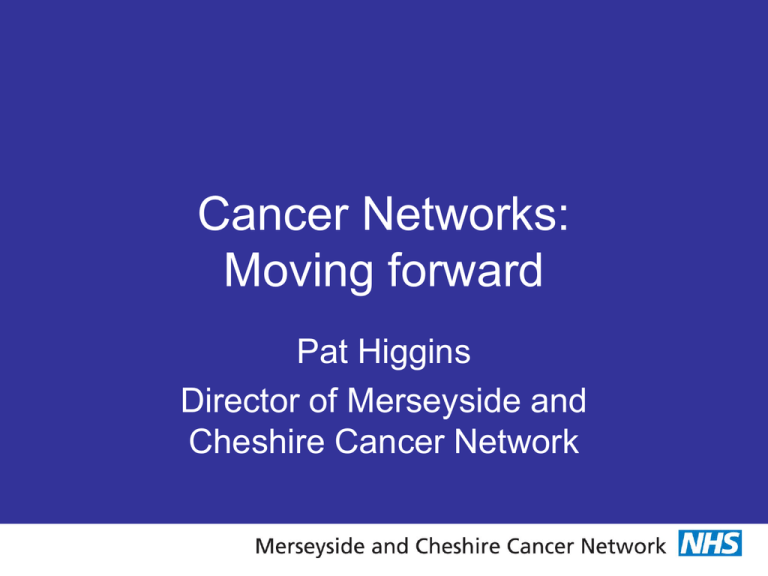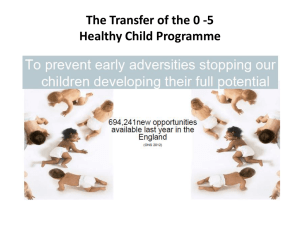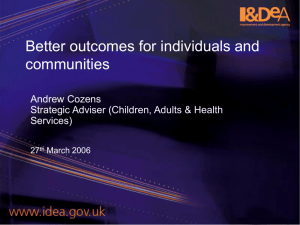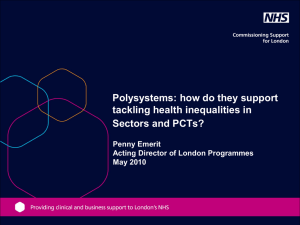network taskforce - Cheshire & Merseyside Strategic Clinical Networks
advertisement

Cancer Networks: Moving forward Pat Higgins Director of Merseyside and Cheshire Cancer Network Summary • • • • • The future role of cancer networks Driving improvement Improving service delivery Integrated working Planning for Reform in M&C and our priorities What are the characteristics of networks • • • • • • Collaborative Partnership Patient centred Consensus Pathways Seamless care Network Structure • • • • • • • Taskforce (Board) Managers Forum Management team Cancer Commissioning Group Lead Clinicians Lead Nurses Forum Clinical Network Groups (CNGs) NETWORK TASKFORCE Network Team Lead Clinician Sefton Sefton PCT, UHA FT, S&O and WCNN Trusts Cancer Commissioning Group Lead Nurses Network Managers Forum Liverpool Eastern Wirral PCT RLBUH & LWH FT /Trusts Warrington, St Helens & Halton and Knowsley PCTs NCH and St H&K Trusts Wirral PCT and Wirral Trust and CCO Urology West Cheshire Countess of Chester FT and Western Cheshire ICN ICN Breast Colorectal ICN ICN ICN OG HPB CAYP Gynae Chemo Lung Pharm Chemo Path Health Inequalities Rad Paed Palliative Sarcoma Neuro Head & Neck SPC Primary Care Haem Kathy Doran Network Chair Pat Higgins Network Director Jackie Sanders Business Support Manager Jon Hayes Deputy Network Director Ged Corcoran Medical Director Kathy Collins Network Manager Linda Devereux Network Manager Sarah Griffiths Business Support Manager Carol Cottrell Business Support Co-ordinator Alison Williams Network Manager Pauline Webster Business Support Co-ordinator Pat Sneddon Nurse Director Anita Corrigan Network Manager Penny Robinson Business Support Coordinator Eleri Philps Patient Dependency Manager Anne Hines Lead Pharmacist Vacancy ICCP Lead Nurse Debbie Moores Business Support Co-ordinator Adrienne Brownrigg Clinical Lead, End of Life Programme Ian Connolly Performance Improvement Manager Claire MacLean Public Health Analyst Simon Pearce Information Analyst Locality Leads 1 Katherine Webb Trainee Public Health Analyst 2 Marie Coughlin Bowel Cancer Screening Manager Mandy Snee Network Manager Cheshire and Merseyside Bowel Cancer Screening Programme (11 members of staff) 3 Tracie Keats ICCP/LD Project Manager 4 1. Sefton: Kathy Collins 2. Liverpool: Linda Devereux 3. Wirral & West Cheshire: Alison Williams 4. Eastern: Anita Corrigan Paul Mackenzie Health Inequalities Manager Key Sandra Rowlands Patient Information Manager Chris Barker Web Manager Lead Team Gloria Payne Patient & Carer Facilitator Dan Seddon Public Health Consultant Prevention and Early Detection Strategy Outline indicates externally funded or temporary post Senior Management Team Improvement Team Information Team Business Support Team Type of Network • • • • • Governed partnership Funded by and accountable to PCTs Core roles defined PCTs sign off objectives and review 6/12 Report to PCT Networks Board via Taskforce Network challenges • 2nd highest incidence rates in the country • Ditto for mortality rates • Trust configuration - high number of specialist trusts • Cancer centre without surgical oncology • Lack of academic research leadership • 5 out of 7 PCTs are Spearhead PCTs Cancer Mortality Rates Best of Europe European Average 20% Gap English Average 14% Gap Merseyside & Cheshire Average North Liverpool 126% female lung Ca Excess deaths from cancer PCT All canc ers Deaths[1 Lung Cancer all Ca 2005 Death s all all Ca 2006 ] Male Female Total Male Female Total Halton & St Helens 66 64 130 23 24 48 883 796 Knowsley 50 45 95 26 33 59 413 449 Liverpool 181 174 355 99 100 199 1398 1330 Sefton 40 29 69 15 27 42 930 834 Warrington 6 -6 0 2 3 5 460 475 West Cheshire 2 9 11 -6 -1 -7 651 693 Wirral 33 49 82 18 24 41 971 1031 Total excess deaths 378 364 742 177 210 387 5706 5612 [1] Source NCHOD mortality all ages all cancers Key Priorities • • • • • • Health Inequalities Better Treatment Living with and beyond cancer Care in appropriate settings Ensuring delivery Building capability and capacity Health Inequalities Primary Care Strategy CPED Strategy Genetics & Fertility – access issues? Social marketing PH Analyst Trainee LD/ACC ACC training DVD CRS screening extension Development of Lead Clinicians’ role Succession planning / AfC Workforce planning Adv Comms Skills BCSP 2WR clinics fit for purpose? Nursing Strategy AHP Strategy Building Capacity and Capability Pt Involvement Strategy E-learning NDP / NDP Next Steps Anatomy & oncology Peer Review • Self Assessment – working group •RAP monitoring CRS NICE uptake audit Ensuring Delivery IOG Delivery Better Treatment •Supportive Care CPORT •HMDS Map of Medicine •CYP NCAG HPB •Skin Pharmacy protocols •Sarcoma Ward dependency •Neuro project Follow-ups project Satellite Radiotherapy Support •Locality Groups •CNGs website Patient information strategy Commissioning toolkit CRS waiting times CPIs SCR & Data Warehousing ICCP Supportive Care •Key worker •Holistic assessment •24/7 7/7 •Psychology •Rehabilitation •Adv Care Planning Living with and Beyond Cancer Palliative Care Strategy M&C response to NW Cancer Plan Inpatient redesign Research Strategy & CRUK Centre Support ICNs Care in Appropriate Settings Key Issues facing networks • • • • Survival! Improving Outcomes Guidance Peer review Influencing the commissioning of cancer services • Service Improvement and re-design • Responding to Cancer Reform Strategy Oesophago-gastric Original configuration: 8 units all delivering full range of services Southport and Ormskirk Aintree St Helens and Knowsley North Cheshire Cardiothoracic Centre Royal Liverpool and Broadgreen Wirral Hospitals Countess of Chester Oesophago-gastric By 2007 3 centres delivering complex care Aintree Cardiothoracic Centre Partnership with North Wales Network Wrexham Peer review • • • • • • Self assessment Self Improving Validation Exception visits Performance monitoring Using the process to drive up quality and improve services What the CRS says about Networks ……………………..to recommend that cancer commissioning is coordinated across a network of care, based on patient care pathways into these services, rather than formal organisational boundaries Commissioning • strengthen the support available to commissioners, including publishing a cancer commissioning guide and planning toolkit; and • Commissioners should also use existing national guidance and standards and the process of peer review to assist them in making commissioning decisions for cancer. World class commissioning • Providing information and support to promote informed choice in treatment and care; • Delivering safe and effective radiotherapy in accordance with the recommendations of the National Radiotherapy Advisory Group; What levers do networks have? 2.42 PCTs will also need to ensure that providers of cancer services collect datasets as set out in national contracts. 2.65 End of Life Care – building on baseline reviews improve access to high quality services close their homes with rapid response services and coordination centres. Important quotes • Networks teams should act as agents for commissioners, supporting them to coordinate their activities and providing shared expertise, maintaining the dialogue with clinical teams and users, agreeing clinical guidelines and pathways and driving forward innovative, high quality care; What does that look and feel like? A bit like this! Or if the technology fails - this! • Herding cats! • Knitting fog Why do we need a North West plan? • Cancer in the North West - challenges to health services and wider community • Future demand for cancer services • Improve preventive programmes • Work with local communities • An opportunity in to address some of these issues collectively & individually. PREVENTION To help prevent cancer we will: Pledge 2: We will implement the tobacco control plan. Pledge 5 : The North West will strive towards reducing obesity especially in children and young people. Pledge 6: The North West will campaign for greater regulation of sun beds to protect children and young people. SCREENING To improve and extend breast screening services: Pledge 6: Unacceptable variations in screening uptake will be investigated and appropriate action will be taken to target the population never screened. PCTs leads will examine the coverage and uptake rates for all screening programmes to improve and maintain uptake by their populations. TREATMENT To improve waiting times for cancer treatments: Pledge 10: We will ensure that all patients in the North West will meet extended standards for waiting times. For second or subsequent surgery and chemotherapy this will mean that patients will wait no longer than 31 days by December 08. All women referred by their GP with breast symptoms will be seen within two weeks by December 2009. All patients with a suspected cancer detected through screening programmes will be treated within 62 days by 2009. To improve the quality of capture of cancer staging at presentation we will: Action: By December 2009 we will have completed the collection of retrospective staging data for cancers diagnosed in 2006. During 2008/09 all data will be collected prospectively through MDTs to capture this in real time, and be used as a basis for treatment decisions TREATMENT To improve access to radiotherapy Pledge 11: Networks, working with their cancer centres and PCTs will develop radiotherapy satellite facilities to meet the expectations within the CRS and NRAG which will guarantee that patients have a maximum travel time of 45 mins for the more common cancers and for those requiring palliative treatment. PCTs will commission any additional capacity that cannot be met from better utilisation of existing equipment.. To deliver local, consistent and safe chemotherapy: Pledge 16: By 2012 Chemotherapy and other systemic therapies will be delivered as close to home as possible where this is safe to do so. QUALITY To reduce cancer inequalities: Pledge 26: By the end of 2008 all networks will have developed rigorous plans that are aimed at reducing the health inequalities experienced by their populations. The inequalities in cancer mortality rates will then be rigorously monitored by the SHA. To commission world class cancer services: Pledge 27: PCTs in the North West commit to the DH world class commissioning programme and the use of the cancer commissioning toolkit when available, through which standardised care across the North West can be monitored. Network Objectives 2008 - 2012 • • • • Early Detection and Prevention Ensuring better treatment Living with and beyond cancer Reducing health inequalities Network Objectives 2008 - 2012 • Delivering care in the most appropriate setting • Ensuring delivery and maintaining progress • Building capability and capacity






